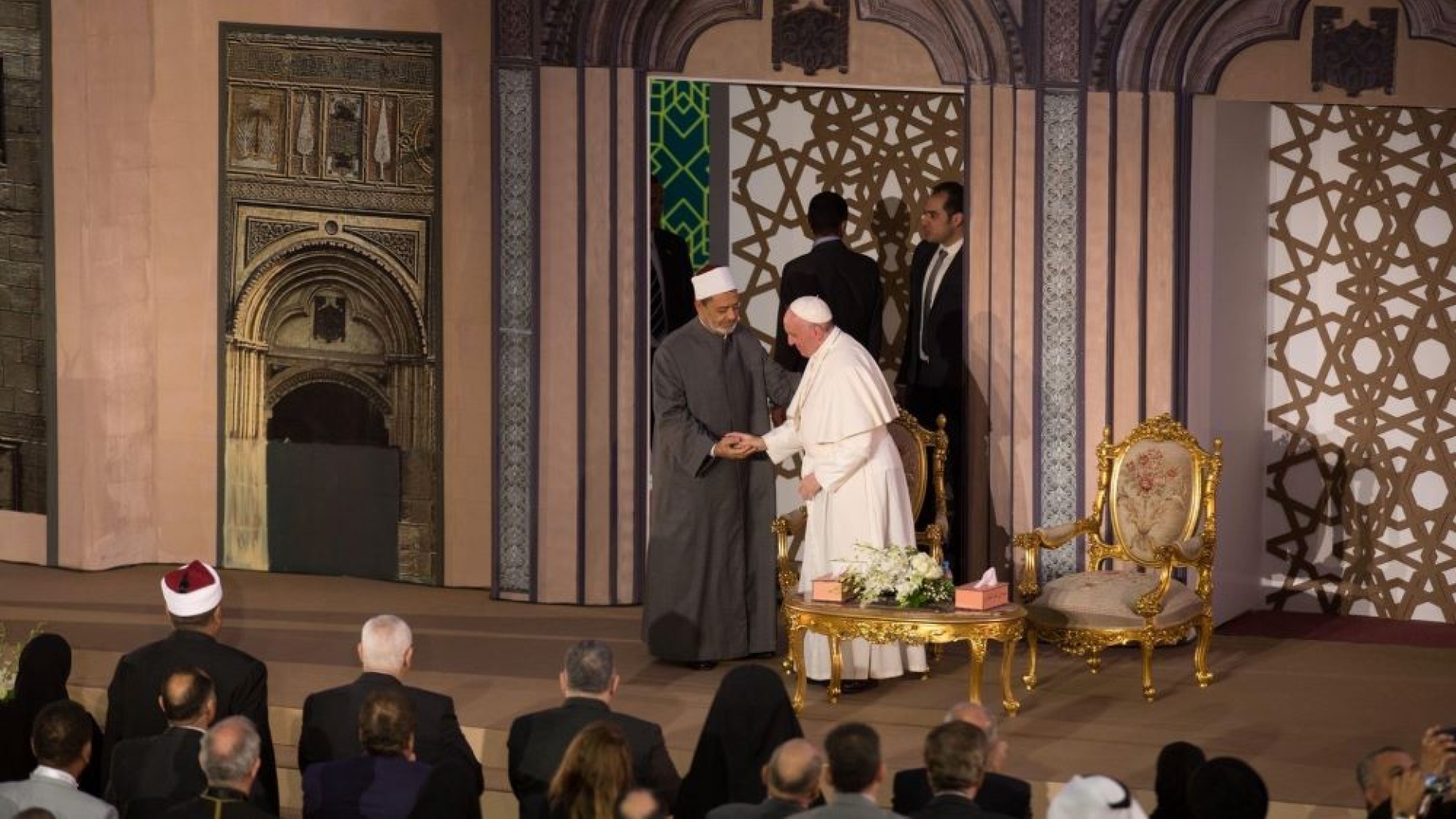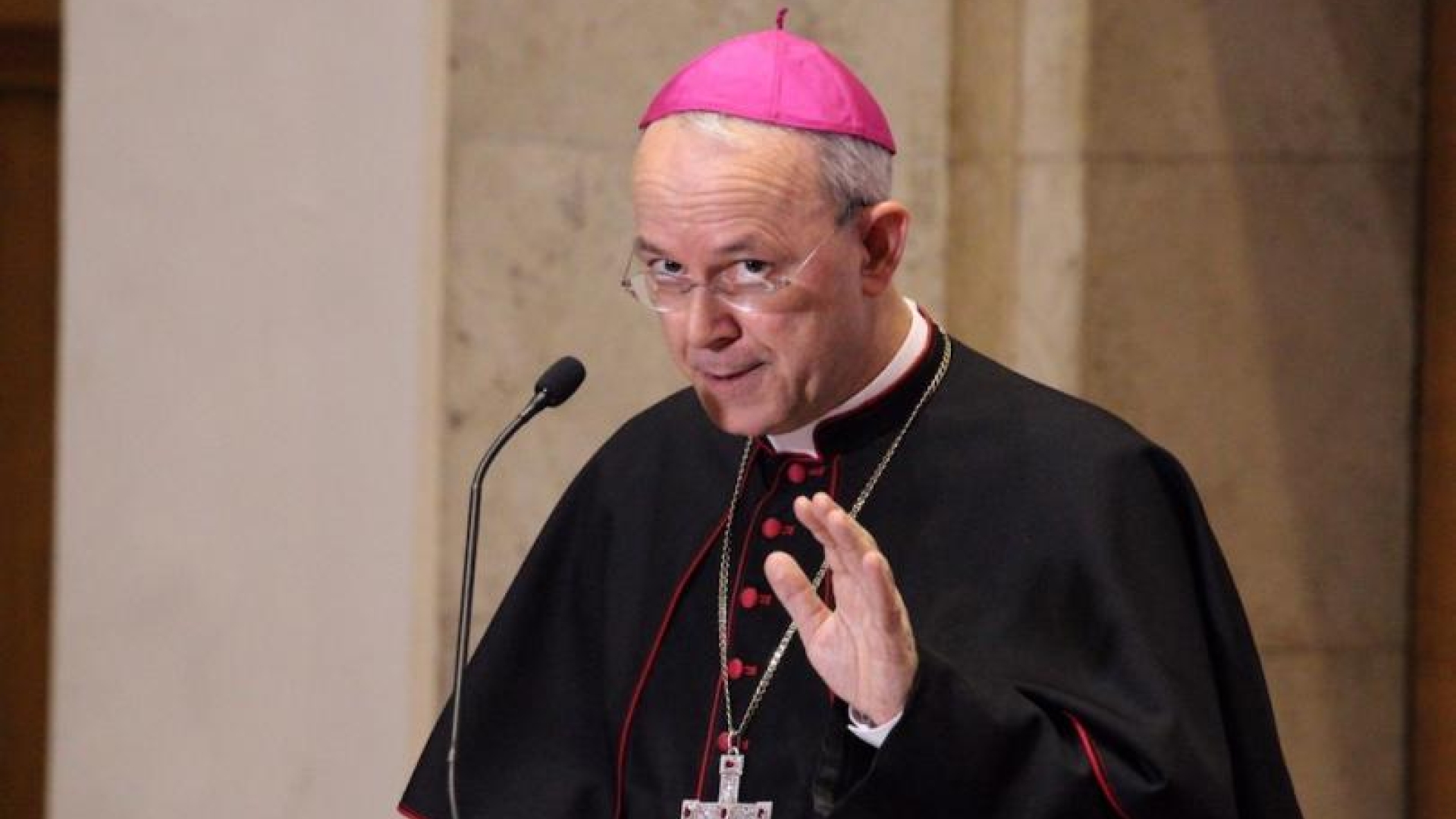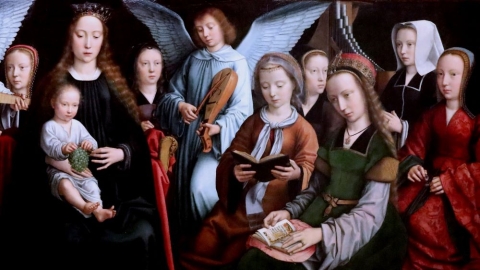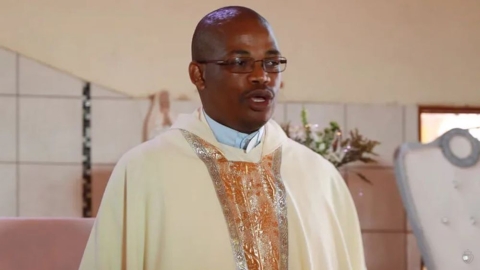A Cardinal and a Bishop Respond to the Abu Dhabi Document on Religious Pluralism

Pope Francis and Grand Imam of Al Azhar University of Cairo
On February 9, 2019, in the aftermath of Pope Francis’ signature on February 4 on a Document “for world peace and living together” with the Grand Imam of Al Azhar University of Cairo on his trip to the UAE, Cardinal Gerhard Ludwig Müller, former prefect of the Congregation for the Doctrine of the Faith, published a “Manifesto of Faith.”
His purpose was to give "public testimony about the truth of revelation:"
It is the shepherds' very own task to guide those entrusted to them on the path of salvation. This can only succeed if they know this way and follow it themselves. The words of the Apostle apply here: ‘For above all I have delivered unto you what I have received’ (I Cor. 15:3). Today, many Christians are no longer aware of the basic teachings of the Faith, so there is a growing danger of missing the path to eternal life.
This manifesto, without referencing the pope, reaffirms that Jesus Christ is our only Saviour, which is an indirect response to the following passage of the statement signed by Francis and the Grand Imam of Al Azhar:
The pluralism and the diversity of religion, colour, sex, race and language are willed by God in His wisdom, through which He created human beings. This divine wisdom is the source from which the right to freedom of belief and the freedom to be different is derived.
Cardinal Müller states,
(…) the first letter of John refers to one who denies His divinity as an antichrist (I Jn. 2:22), since Jesus Christ, the Son of God, is from eternity one in being with God, His Father (CCC 663). We are to resist the relapse into ancient heresies with clear resolve, which saw in Jesus Christ only a good person, brother and friend, prophet and moralist. He is first and foremost the Word that was with God and is God, the Son of the Father, who assumed our human nature to redeem us and who will come to judge the living and the dead. Him alone, we worship in unity with the Father and the Holy Spirit as the Only and True God (CCC 691).
It was noted that the German cardinal quotes the verse from St. Paul that Archbishop Marcel Lefebvre chose to have engraved on his tombstone: “I have delivered unto you what I have received” (I Cor. 15:3); it could also be pointed out that the term “antichrist” borrowed from St. John (I Jn. 2:22) is the word Archbishop Lefebvre wrote in his letter to the future bishops (August 29, 1987) in which he spoke of “the persecution of the Roman antichrist,” giving the reason for his “operation survival:”
This modernist and liberal Rome, is pursuing its work of destruction of the reign of Our Lord, as proved by Assisi and the confirmation of the liberal theses of Vatican II on religious liberty; I am constrained by divine Providence to pass on the grace of the Catholic episcopacy that I have received, so that the Church and the Catholic priesthood may continue to exist for the glory of God and the salvation of souls.
The Archbishop, founder of the Society of St. Pius X, added this the duty of fidelity to Roma aeterna, the eternal Rome:
I beg you to remain attached to the See of Peter, to the Roman Church, Mother and Mistress of all Churches, in the fulness of the Catholic Faith, expressed in the symbols of the Faith, in the Catechism of the Council of Trent, in accordance with what you were taught in the seminary. Remain faithful to the transmission of this Faith so that the reign of Our Lord may come.
It would be too much to claim that Archbishop Lefebvre’s writings influenced Cardinal Müller’s choice of scriptural references, but it is interesting to see that the general confusion, denounced by the former 45 years ago, has brought the latter to use the same quotations today.
The Cardinal’s Manifesto ends in an urgent “Call,” in which he returns to St. Paul’s “quod et accepi:”
As workers in the vineyard of the Lord, we all have a responsibility to recall these fundamental truths by clinging to what we ourselves have received. We want to give courage to go the way of Jesus Christ with determination, in order to obtain eternal life by following His commandments (CCC 2075).
Let us ask the Lord to let us know how great the gift of the Catholic Faith is, through which the door is opened to eternal life. “For he that shall be ashamed of me, and of my words, in this adulterous and sinful generation: The Son of Man also will be ashamed of him, when He shall come in the glory of His Father with the holy angels” (Mk. 8:38). Therefore, we are committed to strengthening the Faith by confessing the truth which is Jesus Christ Himself.”
The Pope is not the UN Secretary General
On February 3, Cardinal Müller granted an interview to journalist Riccardo Cascioli, published on the website Nuova Bussola Quotidiana. His answers shed light on the Manifesto, released six days later. On the issue of homosexuality, which, according to Avvenire (the Italian bishops’ newspaper), is no longer the object of moral reprobation since Amoris Laetitia, Cardinal Müller responds to the larger issue at stake:
It is not true, but even if it was true, a pontifical document cannot change the anthropology that is rooted in God’s creation. It is possible that a pontifical document or the Magisterium of the Church should not explain the facts of Revelation and Creation adequately, but the Magisterium does not constitute Christian doctrine. This is a way of understanding that the Magisterium has nothing to do with Catholic tradition; the pope is treated like an oracle, and everything he says becomes an indisputable truth. But this is not the case: many things are the pope’s private opinion, and thus things we can discuss. If the pope said today that the parts are greater than the whole, would we have changed the structure of mathematics, of geometry? It is absurd! In the same way, if the pope were to say today that we can no longer eat animal meat, while Catholics are not forbidden to eat meat. (…)
The pope’s authority is clearly limited. Some only see his public authority, which is reported in the media, and they use it in accordance with their own opinions, while in reality they do not accept the authority of the pope as it is founded in our ecclesiology. (…)
Riccardo Cascioli tells the Cardinal that for the 800th anniversary of the meeting between St. Francis of Assisi and Egyptian Sultan Malik al-Kamil, “classes on Islam” are being offered “in parishes, and imams are invited to the church to explain who Jesus is for Islam.” The cardinal answers,
Yes, but I bet the parish priest does not go to the mosque to explain the Council of Nicaea. For us, it is an offense to say that Jesus is only a man, not the Son of God; how can we invite someone to our churches to offend us? But today, in Catholicism, we feel guilty about our own Faith and we fall on our knees before all others. First the jubilee of Luther, now that of St. Francis: they are being used to Protestantize and Islamize the Church. This is not true dialogue; some of us have lost the Faith and want to become the slaves of others in order to be liked.
Cardinal Müller's interview continued:
Q. What is the gravest problem the Church faces today?
Cardinal Müller: The relativization of the Faith. Nowadays it seems complicated to announce the Catholic Faith in its entirety with a clear conscience. And yet the world of today deserves the truth, and the truth is the truth of God the Father, the truth of Jesus Christ, the truth of the Holy Ghost. False compromises are not useful to the man of today. Instead of offering the Faith, educating people, teaching people, we have a tendency always to relativize, we always say a little less, a little less, a little less…For example, instead of clarifying the meaning of marriage and indissolubility, we seek out exceptions, we go backwards; instead of addressing the dignity of the priesthood, its glory, the splendor of the truth of the sacraments, we reduce everything to an opportunity to be together. Christianity is made horizontal: we reduce it in order to please the people of today, but in doing this we are deceiving people. When we find ourselves with persons of other religions, we cannot unite with them in a vague faith. The Faith is thus reduced to a philosophical faith, God to a transcendent being, and then we say that Allah and God the Father of Jesus Christ are the same thing. In the same way, the God of the Deists has nothing to do with the God of Christians.
Q. The Pope insists a great deal on the concept of universal fraternity. How must this be understood to avoid this confusion?
Cardinal Müller: I did not like all the praise addressed to the pope by the Freemasons. Their fraternity is not the fraternity of Christians in Jesus Christ; it is greatly inferior. We cannot take as a standard of fraternity that which comes from the French Revolution, which is an ideology, like Communism. Who defines who is my brother? We are brothers among ourselves because we are children of God, because we accept Christ made man. This is the foundation of brotherhood. (…)
If we do not raise the natural brotherhood of man to brotherhood in Jesus Christ, we reject the supernatural dimension and naturalize grace. A universal religion does not exist; what exists is universal religiosity, a religious dimension that draws each man towards mystery. We sometimes hear absurd ideas, like that of the pope as “head of a universal religion,” but that is ridiculous. Peter is pope by his confession or profession of Faith: “Thou art Christ, son of the living God.” He is pope, not the head of the UN!
Cardinal Müller’s mention of the praise heaped on Pope Francis by Freemasonry is a reference to the thanks he received from the Grand Lodge of Spain after his Christmas 2018 message: “All the Masons of the world unite themselves to the petition of the pope for ‘fraternity between persons of diverse religions.”
The Spanish Freemasons said,
In his Christmas message from the central loggia of the Vatican,Pope Francis asked for the triumph of universal brotherhood among all human beings: ‘For this reason, my wish for a happy Christmas is a wish for fraternity. Fraternity among individuals of every nation and culture. Fraternity among people with different ideas, yet capable of respecting and listening to one another. Fraternity among persons of different religions.'
The Freemasons conclude,
The words of the pope show how far the Church has come from the content of Humanum Genus (1884), the last great Catholic condemnation of Masonry.
In his blog, on January 9, Aldo Maria Valli recalled,
In the encyclical Humanum Genus, Pope Leo XIII condemned Masonry without half-measures, stigmatizing ‘the great modern error of religious indifferentism and of the equality of all religions,’ an attitude which the pope of that time called ‘the most opportune way to annihilate all religions, and especially Catholicism, which, because it is the one true religion, cannot be placed in a bundle with all the others without enormous injustice.’
According to the Spanish Masons, the way in which the present pope condemns religious fundamentalism and asks for fraternity and tolerance brings the Church alongside Masonry, uniting them in their commitment to universal fraternity, apart from their differences in the political, cultural, natural and religious fields.
The expression of esteem for the pope by Masonry is noteworthy, but not surprising. After Paul VI, Jorge Mario Bergoglio (who has been an honorary member of the Rotary Club since 1999) is decisively the pope most appreciated by international Masonry.

Bishop Athanasius Schneider.
The Golden Calf Still Stands; Under Religious Pluralism, Martyrdom is Meaningless
On February 8, Bishop Athanasius Schneider, Auxiliary Bishop of the Archdiocese of Astana, Kazakhstan, published a profession of faith that also answered—without directly referencing—the joint declaration of Pope Francis and the Grand Imam of Al Azhar where “diversity of religions” is said to be “willed by God in His wisdom:”
In the past decades one often heard—even from the mouth of some representatives of the Church’s hierarchy—statements about the theory of ‘anonymous Christians.’ This theory says the following: The mission of the Church in the world would consist ultimately in raising the awareness that all men must have of their salvation in Christ and consequently of their filial adoption in Christ. Since, according to the same theory, every human being already possesses the son-ship of God in the depth of his personality. Yet, such a theory contradicts directly divine revelation, as Christ taught it and His apostles and the Church over 2,000 years always transmitted it unchangingly and without a shadow of a doubt. (…)
The most urgent task of the Church in our time is to care about the change of the spiritual climate and about the spiritual migration (he is clearly alluding to Pope Francis’ concern for ecology and migration—Ed.] namely that the climate of non-belief in Jesus Christ, the climate of the rejection of the kingship of Christ, be changed into the climate of explicit faith in Jesus Christ, of the acceptance of His kingship, and that men may migrate from the misery of the spiritual slavery of unbelief into the happiness of being sons of God and from of a life of sin into the state of sanctifying grace. These are the migrants about whom we must care urgently.
Christianity is the only God-willed religion. Therefore, it can never be placed complementarily side by side with other religions. (…)
There is only one way to God, and this is Jesus Christ, for He Himself said: ‘I am the Way’ (Jn. 14: 6). There is only one truth, and this is Jesus Christ, for He Himself said: ‘I am the Truth’ (Jn. 14: 6). There is only one true supernatural life of the soul, and this is Jesus Christ, for He Himself said: ‘I am the Life’ (Jn. 14: 6).
The Incarnated Son of God taught that outside faith in Him there cannot be a true and God-pleasing religion: ‘I am the door. By me, if any man enters in, he shall be saved’ (Jn. 10: 9). God commanded all men, without exception, to hear His Son: ‘This is my most beloved Son; hear Him!’ (Mk. 9:7). God did not say: ‘You can hear my Son or you can hear other founders of a religion, for it is my will that there are different religions.’ God has forbidden us to recognize the legitimacy of the religion of other gods: ‘Thou shalt not have strange gods before me’ (Ex. 20: 3), and ‘What fellowship has light with darkness? And what concord has Christ with Belial? Or what part has the faithful with the unbeliever? And what agreement has the temple of God with idols?’ (II Cor. 6: 14-16).
If other religions likewise corresponded to the will of God, there would not have been the divine condemnation of the religion of the golden calf at the time of Moses (cf. Ex. 32: 4-20); then the Christians of today could cultivate unpunished the religion of a new golden calf, since all religions are, according to that theory, God-pleasing as well.
For all times, God gave the apostles and through them the Church the solemn order to instruct all nations and the followers of all religions in the one and only true Faith, teaching them to observe all His Divine commandments and baptize them (cf. Mt. 28: 19-20). Since the preaching of the apostles and of the first pope, the Apostle St. Peter, the Church always proclaimed that there is salvation in no other name, i.e., in no other faith under Heaven by which men must be saved, but in the name and in the Faith in Jesus Christ (cf. Acts 4: 12). (…)
The Apostles and the countless Christian martyrs of all times, especially those of the first three centuries, would have been spared martyrdom, if they had said: ‘The pagan religion and its worship is a way, which as well corresponds to the will of God.’ There would have been for instance no Christian France, no ‘Eldest Daughter of the Church,’ if St. Remigius had said to Clovis, the King of the Francs: ‘Do not despise your pagan religion you have worshiped up to now, and worship now Christ, whom you have persecuted up to now.’ The saintly bishop spoke differently, although in a rather rough way: ‘Worship what you burned, and burn what you have worshiped!’
True universal brotherhood can be only in Christ, and namely, among baptized persons. The full glory of God’s sons will be attained only in the beatific vision of God in Heaven, as Holy Scripture teaches: ‘See what kind of love the Father has given to us, that we should be called children of God; and so we are. The reason why the world does not know us is that it did not know Him. Beloved, we are God's children now, and what we will be has not yet appeared; but we know that when He appears we shall be like Him, because we shall see Him as He is’ (I Jn. 3: 1-2).
No authority on earth—not even the supreme authority of the Church—has the right to dispense people from other religions from the explicit Faith in Jesus Christ as the Incarnated Son of God and the only Savior of mankind with the assurance that different religions as such are willed by God Himself. Indelible—because written with the finger of God and crystal-clear in their meaning—remain, however, the words of the Son of God: ‘Whoever believes in the Son of God is not condemned, but whoever does not believe is condemned already, because he has not believed in the name of the only Son of God’ (Jn. 3: 18). This truth was valid up to now in all Christian generations and will remain valid until the end of time, regardless of the fact that some people in the Church are so fickle, cowardly, sensationalist, and conformist. Giving time to reinterpret this truth is contrary to its evident wording, and sells thereby this reinterpretation as a continuity in the development of doctrine.
Related links
- Visite pastorale aux Emirats arabes unis, 3-5 février 2019
- Egypte : « La charité sans la vérité, cela ne va pas ! », dit le P. Boulad
- Deux mille ans de mission, quarante ans de dialogue interreligieux
- Difficile dialogue interreligieux entre le Vatican et l´Université du Caire
- Les impasses du dialogue interreligieux avec l’islam
- Communiqué du Supérieur général de la FSSPX : la vraie fraternité
- Document sur la Fraternité humaine : de l’utopie à l’hérésie
(Sources: NBQ—Aldo Maria Vallie—Rorate Caeli—National Catholic Register—Benoit et moi—DICI no. 381, February 2019)





